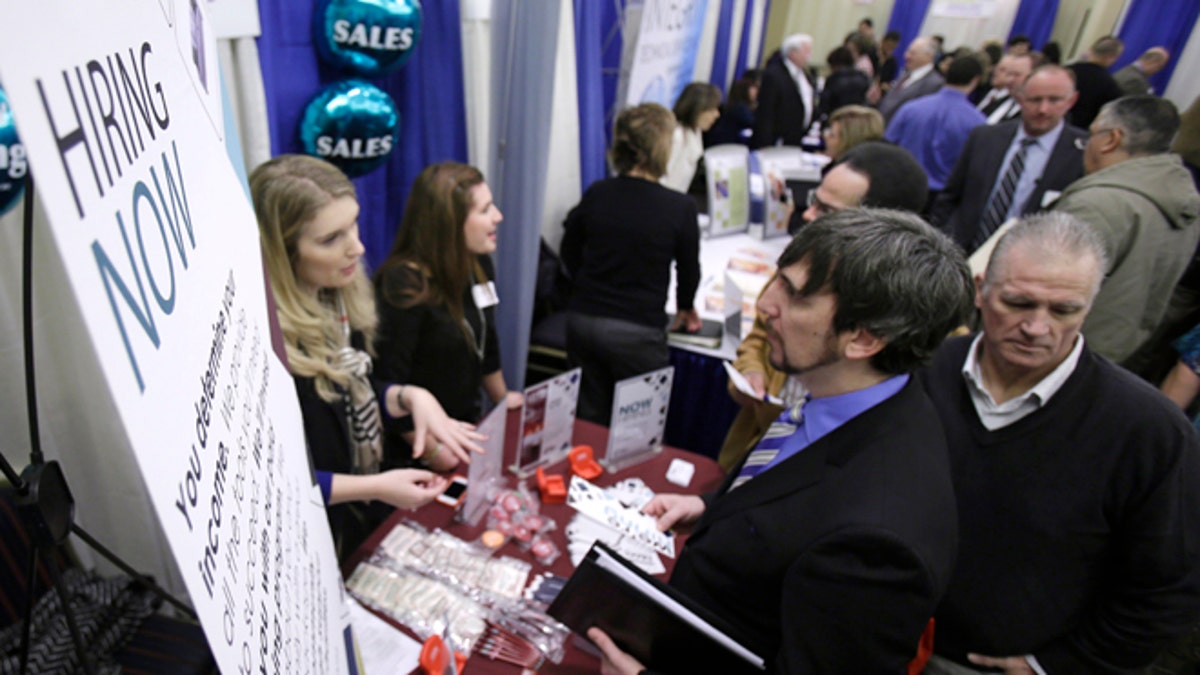
FILE: Jan. 16, 2013: Job seekers talk with employers during a job fair in Cuyahoga Falls, Ohio. (AP)
A Maryland court has dismissed a lawsuit against an events-services company accused by the Equal Employment Opportunity Commission of discriminatory hiring practices, a setback for a federal agency that increasingly argues the use of credit reports and criminal background checks can disproportionately impact minorities.
The judge stated that using such checks can in some cases be discriminatory. However, the EEOC “bears the burden of applying reliable expert testimony and statistical analysis that demonstrates disparate impact stemming from a specific employment practice before such a violation can be found. … The EEOC has failed to do so in this case."
Kevin Connell -- chairman of the Florida-based employment and tenant screening company AccuScreen.com -- told FoxNews.com on Saturday that the judge took particular issue with the reliability of the EEOC’s expert witness, workplace psychologist Kevin Murphy.
Connell said he wasn’t surprised, in part, because Murphy’s testimony came under heavy court scrutiny in a recent, similar case.
In January, an Ohio district court excluded Murphy’s expert testimony in one of the EEOC’s first cases involving the use of credit reports, against Kaplan Higher Education Corp.
In dismissing the case, the court said the federal agency failed to establish that Murphy used reliable methodology.
The court’s Aug.9 decision on the Freedman case came amid recent efforts by the EEOC to limit criminal background checks.
In April 2012, the agency issued guidelines that warn such checks can discriminate against African-Americans because they are being arrested at a disproportionate rate compared to the rest of the U.S. population.
Fifteen months after issuing the guidelines -- which included the recommendation that businesses eliminate such policies -- the commission filed lawsuits against discount retailer Dollar General and a BMW facility in South Carolina for alleged civil rights violations.
The suits have re-ignited concerns over such issues as potential federal overreach, the overlap of state and federal law and companies losing their rights to protect customers, workers and assets while trying to adhere to fair hiring practices.
And last month, attorneys general across the country wrote a letter to the EEOC that asks the agency to reconsider the two suits and argues they are “a quintessential example of gross federal overreach.”
The commission acknowledged upon updating the policy in 2012 that civil rights laws already prohibit different treatment for job applicants with different ethnic backgrounds but identical criminal histories.
While the percentage of working-age Americans with a criminal record has increased significantly over the past 20 years, African Americans and Hispanics are arrested two to three times as much compared with the rest of the U.S. population, according to a commission report at the time of the vote.
Connell said Freeman has been cleared but was hit hard financially by the case, including roughly four years of paying for legal services, and that the company’s future earning power will likely be diminishing because others will still think Freeman must have done something improper to become the focus of a suit. Connell also said he expects Freeman to try to recoup from the federal government some of the costs associated with the case.
In the case, the judge also said “The EEOC has placed many employers in the “Hobson’s choice” of ignoring criminal history and credit background, thus exposing themselves to potential liability for criminal and fraudulent acts committed by employees, on the one hand, or incurring the wrath of the EEOC for having utilized information deemed fundamental by most employers.”
























